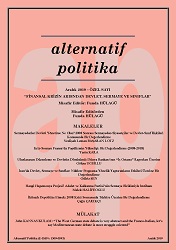SERMAYEDARLAR DEVLETİ YÖNETİRSE NE OLUR? 2008 SONRASI SERMAYEDAR-SİYASETÇİLER VE DEVLET-SINIF İLİŞKİLERİ KONUSUNDA BİR DEĞERLENDİRME
WHAT IF CAPITAL RULES? AN ANALYSIS ON CAPITALIST-POLITICIANS AND THE RELATIONS BETWEEN STATE AND SOCIAL CLASSES AFTER THE 2018 CRISIS
Author(s): Neslişah Leman Başaran LotzSubject(s): Governance, Government/Political systems, Political economy, Politics and society, Sociology of Politics
Published by: Rasim Özgür DÖNMEZ
Keywords: State Theory; Relative Autonomy; Capitalist-Politician; Bourgeoisie; State-Capital Relations;
Summary/Abstract: The article argues that the capitalist-politicians who came into power after the 2008 crisis brings about a new tendency in state government in which the government is identified with the capitalist class and the latter’s certain fractions are more directly related to the state power; and this entails the disappearance of the supposed autonomy of the capitalist state. To prove this argument, the article examines the examples of Donald Trump and Recep Tayyip Erdoğan regarding the political power-capitalist class relations: the first one became the U.S.A president as one of the world’s richest businessman and the other one increases its capital while he is the President of Turkey. Based on these two examples, the article claims that state theories based on the sharp distinctions between economic and political realms and taking for granted the “relative autonomy of the state” as an essential principle of the capitalist state fall short to explain this new tendency. To prove this, the article discusses the explanatory power of the state theories of Ralph Miliband, Nicos Poulantzas, Simon Clarke, John Holloway and Sol Picciotto regarding state-class relations and argues that rather than the structuralist conception of “relative autonomy”, the historical approach that explains the capitalist state as a historical form of class domination which contains in itself the class conflicts because it is shaped by these would be more useful to better understand and analyze the capitalist-politician examples that arose after 2008 crisis.
Journal: Alternatif Politika
- Issue Year: 11/2019
- Issue No: Special
- Page Range: 1-28
- Page Count: 28
- Language: Turkish

